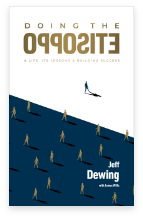Blog

“You must trust and believe in people, or life becomes impossible”
Anton Chekov
Trust is a tricky thing.
For a long time, I believed that trust was one of those things that was impossible to quantify. To many people, trust is a gut feeling or an instinct – not something to be calculated. I always felt that (to quote a Supreme Court Justice talking about pornography) “I can’t define it, but I know it when I see it”. Even so, we base so much of our lives on trust. Indeed, when you stop and think about it, it seems crazy that we operate so much on instinct.
Trust is a vital part of any business’ operations. If you can’t trust your employees, you can’t guarantee your results. If you can’t trust those in leadership, you can’t guarantee your best interests. Trust is the foundation upon which we build our relationships, our businesses and our society as a whole.
There exists, however, a handful of people who weren’t content with living lives based on instinct alone and sought to understand why we have faith in the people we do. They wanted to provide an explanation for why we trust the way we do – and the Trust Equation was born.
There are two parts in any interaction based on trust. First, the person who reaches out and is ‘trusting’ and the recipient of that trust, who is (or isn’t) ‘trustworthy’. The Trust Equation serves as a valuable method for determining just how ‘trustworthy’ that recipient really is.

Complex looking, I know – but bear with me here, and we’ll break this down piece by piece.
Credibility, at its core, is the extent to which someone is competent or has suitable credentials. Perhaps they’re well known in a field as an expert; or as someone who has had a great deal of experience. Thinking about credibility encourages us to think about how capable someone is at performing a particular task or role.
Reliability, on the other hand, is less easy to measure by checking a resume. Reliability is the extent to which someone can be consistent, has a reputation as someone who does what they say they will do and has references from others to back it up.
Intimacy, however, unlike the previous two parts of the equation, is a lot less tangible. Intimacy is a measure of how secure you feel when dealing with someone. Do you feel at ease sharing information with them? Do you feel confident in their personality and the way in which they respond to you?
Finally we come to the bottom half of the equation – self orientation. Simply put, this is a measure of how much you believe that this person is in it for themselves. A high score on this part of the equation is an indicator of someone who may be driven by more selfish motivations – approaching you for their own personal gain or interest. Perhaps they’re interested in gaining your trust to develop their own career, or to line their own pockets. It’s a tricky thing to gauge, but it’s also the most important part of the equation, with the highest effect on the final score.
When approaching someone with your trust, use the formula to try and get a feeling for their level of ‘trustworthiness’. Give each part of the equation a score out of ten, based on the guidance below and plug it into the equation. An ideal candidate will have high marks on the three top variables, and a low score on the bottom. Using this framework, we can peel away the layers of what it means to be ‘trustworthy’, and figure out for ourselves whether we should place our trust in them or not.
Trust is the key to building strong relationships – both in business and in life. It interacts with every part of our business processes, from hiring a new employee; to finding new business; to partnering with other companies and even the process of considering expansion. It’s hard to gauge with a gut feeling the extent to which we should trust others, but with this framework, it’s possible to dig a little deeper, take the control away from the gut and give it (at least, in part) back to the mind.
What this approach helps us understand, is that if you can identlify a high level of self serving in an individual, it is highly likely they will have a materially lower element of trustworthiness, irrespective of the other components of the Trust equation.
I’m not saying that every decision should be made by busting out the calculator, but for those vital moments where it really matters to decide whether to trust someone or not, considering this equation will make a vital difference.
Trust me.

